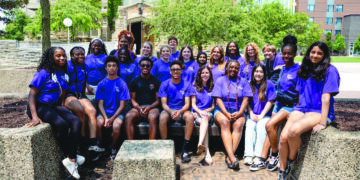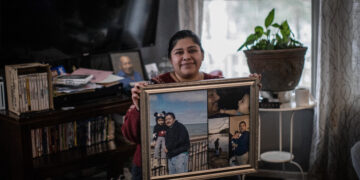By Mickey Lyons
Just a year ago, Gabriela Santiago-Romero stepped up as District 6 Representative for Detroit City Council, having taken over where her friend and mentor Raquel Castañeda-Lopez left off. Santiago-Romero hasn’t stopped since, in a whirlwind year of firsts for the longtime advocate and Southwest Detroit resident, as she has pushed for environmental justice, affordable housing and public safety. She has learned a lot in her first year in office, she tells EL CENTRAL, and has plenty of work left to do for her district.
Santiago-Romero’s career before her run for office prepared her for public service. A social worker, she has held several positions in nonprofit work in Michigan. Santiago-Romero organized the nonprofit aid group Southwest Detroit Community Care in the beginning of the COVID-19 pandemic to bring together community resources for food, diapers, money and other assistance. Before that, she worked as a policy and research director at We the People Michigan, a grassroots group that advocates for working-class families. Santiago-Romero has worked in the offices of then Michigan State Representative, now State Senator Stephanie Chang, and Warren Evans, Wayne County Executive. She credits her work with predecessor Castañeda-Lopez as the inspiration behind her run for office in 2021.
Her first year has been an active one. She serves on the Budget, Finance and Audit Standing Committee, and is the first Latina to chair a standing committee, Public Health and Safety. “I came into City Council really nervous, but it’s not rocket science. It’s very manageable,” she says. “It’s a lot, I’m not going to lie. And no, I don’t know everything. But the answers are there, you can find them, and if you work hard you can figure them out.”
The Big 3
Santiago-Romero has focused her first year on three priorities, she says: affordable housing, mitigating environmental impacts, and safety. “Every time that I knocked on people’s doors, their main concern was just the amount of crime that we had, and how expensive things were getting — primarily homes and rents,” she says. “Folks do feel like they’re being pushed aside” in favor of newer residents, she says.
As head of the Public Health and Safety committee, Santiago-Romero has been a vocal opponent to the controversial ShotSpotter program. ShotSpotter is a remote gunfire detection software installed in high-crime areas that alerts police; Santiago-Romero and two other council members, Mary Waters and Angela Whitefield-Calloway, argue that the program is an example of racial profiling and targets low-income neighborhoods unfairly. Santiago-Romero instead advocates for more nuanced police responses to mental health calls, and for expanded police training. “I’m really focused on supporting our officers, in having them focus on the violent crime and having mental health professionals be the ones that respond to those nonviolent mental health calls,” she says.
One of her highest priorities on Council is environmental justice. District 6 is home to the most polluted zip code in Michigan, 48217. The asthma rate for Detroit adults is 46% higher than in the rest of Michigan; in Southwest Detroit, asthma hospitalizations for children have increased dramatically in recent years. Construction of the Gordie Howe International Bridge has added to residents’ worries about pollutants and air quality, says Santiago-Romero. “It’s scary for a lot of us to think of more industry and trucks coming through. I really want [Detroit] to be at the forefront of a truck route with green spaces, pollution mitigations, more trees, more green buffering, so that if we’re going to have industry, we also have healthy communities.”
No Idling
Santiago-Romero is working on a long-term truck idling ordinance. “I get pictures from residents, saying ‘There’s a truck just hiding down in the corner of my street,’” she says. “And they’re literally just sitting there with the truck on, eating or sleeping or waiting for whatever they have to wait for.” This idling spews carbon monoxide and other pollutants into the air on residential streets, and Santiago-Romero and other residents worry that once the bridge is operating the pollution will continue — or worsen.
“With DPW, and our planning departments, we look at short term mitigations, whether that’s making streets smaller, making it harder for trucks to turn on certain areas, better signage that says ‘don’t go through the street, go through that streets,’” she says. “Because we can do that right now. I mean, we reroute traffic all the time for construction or for emergency reasons. So we’re trying to say, ‘this is an emergency, the fact that residents have 100 trucks going through their homes a day.’”
In the short term, Santiago-Romero has worked to ensure language services for Detroit residents. One recent achievement she is proud of is the translation service offered to Detroiters. All formal City Council sessions now have a specific Zoom video conference room with a dedicated Spanish language translator.
As for what’s next, Santiago-Romero says she’ll continue her work for District 6 residents. “I’m incredibly grateful for the opportunity” to serve, she says. “A lot of what we’re doing is to include others and to engage others in the process. So I just really hope that people follow us along…and try to plug in, because that’s what makes me better in my job. It allows for better local government, if People are engaged, holding us accountable, if they know how they themselves can be the checks and balances to our work.”
Mickey Lyons is a Hamtramck-based journalist and author. She specializes in Detroit history, and has published articles in Hour Detroit, The Detroit News, The Detroit Free Press, and NBC News.
Hace apenas un año, Gabriela Santiago-Romero asumió el cargo de Representante del Distrito 6 para el Concejo Municipal de Detroit, antecedida por su amiga y mentora Raquel Castañeda-López.
La nueva concejal no ha parado desde entonces, ha sido un año lleno de primicias para esta residente del suroeste de Detroit que ha trabajado por los derechos humanos, presionando por la justicia ambiental, la vivienda asequible y la seguridad pública. Ella ha comentado para EL CENTRAL que ha sido un año lleno de aprendizaje en el cargo que está desempeñando y que aún le queda mucho trabajo que hacer por su distrito.
La profesión de Santiago- Romero antes de postularse para el cargo la preparó para el servicio público. Como Licenciada en Trabajo Social, ocupó varios puestos en organizaciones sin fines de lucro en Michigan. Santiago Romero organizó el grupo de asistencia sin fines de lucro Southwest Detroit Community Care al comienzo de la pandemia de COVID-19 para poder reunir recursos comunitarios para la adquisición alimentos, pañales, ayuda monetaria, etc. Antes de eso, trabajó como Directora de Políticas e Investigación en la organización We the People Michigan, un grupo de base que aboga por las familias de clase media y baja; también laboró en las oficinas de la entonces representante estatal de Michigan, ahora senadora estatal Stephanie Chang, y Warren Evans, ejecutivo del condado de Wayne. Gabriela Santiago-Romero legitima su trabajo con su predecesora Castañeda-López como la inspiración detrás de su candidatura al cargo en el año 2021.
Su primer año ha sido muy activo. Es miembro del Comité Permanente de Presupuesto, Finanzas y Auditoría, y es la primera latina en regir un comité permanente de Salud y Seguridad Pública. “Llegué al Concejo Municipal muy nerviosa, pero no es cosa del otro mundo. Es algo manejable”, dice. “Es bastante, no voy a mentir. Y no, no lo sé todo. Pero las respuestas están ahí, puedes encontrarlas y, si trabajas duro, puedes descifrarlas”.
Los tres grandes retos
Santiago-Romero ha centrado su primer año en tres prioridades, dice: vivienda asequible, mitigación de impactos ambientales y seguridad. “Cada vez que tocaba la puerta de las personas de la comunidad, su principal preocupación era la delincuencia que teníamos y lo costosas que se estaban poniendo las cosas en especial las casas y los alquileres”, dice. “La gente siente que la están haciendo a un lado” en favor de los residentes más nuevos, dice ella.
Como jefa del comité de Salud y Seguridad Pública, Santiago-Romero se ha opuesto abiertamente al controvertido programa ShotSpotter, el cual es un software de detección remota de disparos instalado en áreas de alta criminalidad que alerta a la policía; Santiago-Romero y otras dos concejales, Mary Waters y Angela Whitefield-Calloway, argumentan que ese programa es un ejemplo perfilado racial y apunta injustamente a los vecindarios de bajos ingresos.
En cambio, Santiago-Romero aboga por respuestas policiales más matizadas a las llamadas de salud mental y por una mayor capacitación policial. “Realmente estoy enfocada en apoyar a nuestros oficiales, en hacer que se centren en el crimen violento y que los profesionales de la salud mental sean los que respondan a esas llamadas de salud mental no violentas”, dice ella.
Una de sus mayores prioridades en el Concejo es la justicia ambiental. El Distrito 6 alberga el código postal más contaminado de Michigan, 48217. La tasa de asma para los adultos de Detroit es un 46 % más alta que en el resto de Michigan; en el suroeste de Detroit, las hospitalizaciones de niños por asma han aumentado drásticamente en los últimos años. La construcción del Puente Internacional Gordie Howe se ha sumado a las preocupaciones de los residentes sobre los contaminantes y la calidad del aire, dice Santiago-Romero.
“A muchos de nosotros nos da miedo pensar en la llegada de más industrias y camiones. Realmente quiero que [Detroit] esté a la vanguardia de una
ruta de camiones con espacios verdes, mitigaciones de la contaminación, más árboles, más zonas verdes, para que, si vamos a tener industria, también tengamos comunidades saludables”.
Sin Paradas de Camiones
Santiago-Romero está trabajando en una ordenanza para evitar las paradas de camiones dentro de las zonas residenciales a largo plazo. “Recibo fotos de los residentes que dicen: ‘Hay un camión escondido en la esquina de mi calle’”, dice. “Y literalmente están sentados allí con el camión encendido, comiendo o durmiendo o esperando lo que sea que tengan que esperar”. Esta inactividad arroja monóxido de carbono y otros contaminantes al aire en las calles residenciales, y Santiago Romero y otros residentes temen que una vez que el puente esté en funcionamiento, la contaminación continuará, o empeorará.
“Con DPW y nuestros departamentos de planificación, analizamos las mitigaciones a corto plazo, ya sea hacer las calles más pequeñas, dificultar que los camiones giren en ciertas áreas, mejor señalización que diga ‘No hay paso por esta calle, gire en “tal” calle. ,’” ella dice. “Porque podemos hacer eso ahora mismo. Quiero decir, desviamos el tráfico todo el tiempo por motivos de construcción o de emergencia. Así que estamos tratando de hacer ver que, ‘esto es una emergencia, el hecho de que los residentes tengan 100camiones pasando por sus casas al día’”.
Gabriela Santiago-Romero ha trabajado para garantizar servicios lingüísticos para
los residentes de Detroit, sintiéndose orgullosa del logro de los servicios de traducción que se tienen actualmente para los habitantes. Todas las sesiones formales del Concejo Municipal ahora tienen una sala de videoconferencia en Zoom específica con un traductor dedicado al español.
Refiriéndose a sus futuros retos, Santiago-Romero expresó que continuará el trabajo por los residentes del Distrito 6. “Estoy increíblemente agradecida por la oportunidad de servir”, dice. “Mucho de lo que estamos haciendo es incluir a otros en el proceso. Así que realmente espero que la gente se involucre… y trate de conectarse, porque eso es lo que me hace mejor en mi trabajo. Si las personas están comprometidas, haciéndonos responsables, si saben cómo ellos mismos pueden ser los controles y contrapesos de nuestro trabajo nos permite que tengamos un mejor gobierno local”.
Mickey Lyons es un periodista y autor de Hamtramck. Se especializa en la historia de Detroit y ha publicado artículos en Hour Detroit, The Detroit News, The Detroit Free Press y NBC News.









































